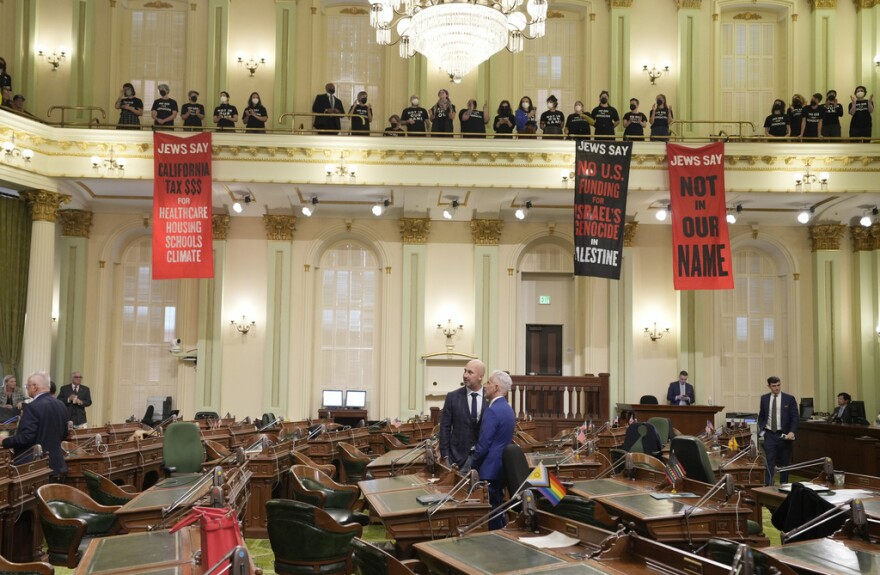Hundreds of protesters calling for a cease-fire in the Israel-Hamas war interrupted the first day of California's legislative session on Wednesday, forcing the state Assembly to adjourn just moments after convening.
Lawmakers had just listened to the opening prayer and said the Pledge of Allegiance when protesters wearing matching black t-shirts stood from their seats and started singing “Cease-fire now" and “Let Gaza live.”
A few people unfurled banners from the chamber's gallery that read: “Jews say never again for anyone.”
At first, Jim Wood, a Democratic assemblymember from Healdsburg who was presiding over the session, tried to continue the session despite the singing. Eventually though he called for a recess and adjourned a few minutes later.
Nearly all of the lawmakers left the floor. Protesters cheered when officials turned the lights off in the chamber, holding up the flashlights on their phones as they continued to sing, which included a lengthy call-and-response chant from the gallery.
“We are Jews and Californians, Assembly members, we call on you to join us in demanding a cease-fire now,” they said.
Democratic Assembly Speaker Robert Rivas' office declined to comment. Assemblymember James Gallagher, the Republican leader, said the protesters obstructed their work.
“Look, we’re trying to open up our session. Granted, we probably didn’t have a whole lot of, you know, big business to do today. But if the objective is to shut down the government functions, I don’t think that’s a good way to go about getting your message across,” he said. “We can’t let them shut us down. We have to go about our business. We have big pressing issues this year.”
Wednesday’s protest was organized by groups including Jewish Voice for Peace, IfNotNow and the International Jewish Anti-Zionist Network. Binya Kóatz, a Jewish teacher and artist who lives in the San Francisco Bay Area, said Americans have “not only the right but the responsibility to stop business as usual as long as our country is giving a blank check to Israel.”
Kóatz said the groups chose to protest at the California state Legislature because, while those lawmakers do not control federal money sent to Israel, “we know that state Legislatures have the ear of their national counterparts in California and that getting this body to call for a cease-fire now can put California at the forefront of the national movement.”
It's not the first time that protesters calling for a cease-fire have disrupted events in California's capital city. In November, protesters forced their way inside a Sacramento convention hall and prompted the California Democratic Party to cancel some events during their nominating convention. And last month, Democratic Gov. Gavin Newsom canceled an in-person Christmas tree lighting ceremony after protesters planned an action at the event.
Protesters did not disrupt the state Senate, which held its session as scheduled and included lawmakers giving speeches in memory of former U.S. Sen. Dianne Feinstein, who died in September.
Across the country, it was a day of disruptions at state capitols. A bomb threat emailed to officials in multiple states prompted evacuations of statehouse offices or buildings in Connecticut, Georgia, Hawaii, Kentucky, Maine, Michigan, Minnesota, Mississippi, Montana. Other states — including Missouri, Maryland, Nebraska, New Hampshire, Oklahoma and Wyoming —received threats but did not evacuate.
California’s legislative session, which began Wednesday and runs through Aug. 31, is expected to be dominated by decisions on artificial intelligence and the massive budget deficit. But as Wednesday’s protest showed, ongoing fallout from the Israel-Hamas war will likely have an impact.
The California Legislative Jewish Caucus sent a letter to state lawmakers on Wednesday, calling for the creation of a committee to explore policy changes to protect the Jewish community.
“We have our own criticisms of Israel. We want the war to end,” said Democratic state Sen. Scott Wiener of the Jewish caucus. “We also know the cease-fire resolutions we see at the local level have at times gone off the rails in terms of dredging up a lot of anti-Jewish hate and that causes a lot of fear in our community.”
Assemblymember Jesse Gabriel, a Democrat from Los Angeles, said his 3-year-old child now has to walk through metal detectors to enter his preschool at a local synagogue.
“The level of fear and anxiety and tension is unlike anything I have ever seen in my lifetime,” Gabriel said.
Lawmakers are scheduled to return to the chamber on Thursday morning. But the bulk of their work will come later, after Democratic Gov. Gavin Newsom reveals his plan for how to cover an estimated $68 billion deficit — a shortfall that is larger than the entire operating budgets of many states.
And with many California companies at the forefront of the artificial intelligence boom, a number of state lawmakers are eyeing ways to govern the use of the technology before it dominates daily life — much like social media.
State Sen. Steve Padilla proposed a measure Wednesday to require California to establish safety, privacy, and nondiscrimination standards around generative AI tools and services. Those standards would eventually be used as qualifications in future state contracts. He also introduced a plan to create a state-run research center to further study the technology.
Assemblymember Akilah Weber said she’ll try to tackle “deepfakes” through a bill that would require labeling on AI-generated content.






